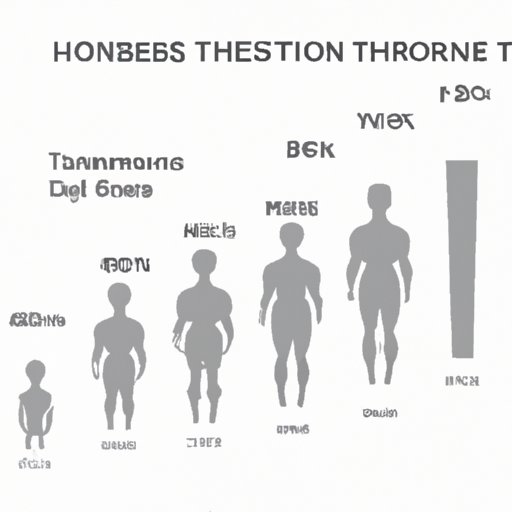
I. Introduction
When it comes to height, many people wonder whether there is anything they can do to grow taller. One common theory is that higher levels of testosterone can lead to increased height. But is there any truth to this claim? In this article, we will explore the connection between testosterone and height growth to help you understand the science behind how it works.
II. The Science Behind Testosterone and Height: Exploring the Connection
Testosterone is a hormone that is primarily associated with male development, and it plays an important role in growth. Testosterone affects growth in general, but it has an especially important role in bone growth. Testosterone is one of the main hormones responsible for the development of masculine traits, including bone density and muscle mass, which are directly related to overall height.
However, testosterone is not the only hormone involved in height development. Estrogen and growth hormone also play important roles in bone growth and height development. Estrogen is particularly important for female height development, while growth hormone contributes to both male and female height development. These hormones work together in a complex way to affect the growth of bones, which is why it is difficult to say that one hormone is solely responsible for height development.
III. Can Higher Testosterone Levels Help You Grow Taller? A Look at the Truth
There have been studies that show a correlation between higher testosterone levels and taller height. However, these studies have several limitations. For example, these studies were mostly done on animals, meaning that their results cannot be applied to humans directly. Additionally, height is influenced by various factors, such as genetics and other hormones besides testosterone.
In other words, while higher levels of testosterone may contribute to height development, they are not the sole determining factor for growing taller. Other factors may also influence height, which is why simply increasing testosterone levels may not lead to significant height growth.
IV. Debunking the Myth: Does Testosterone Actually Make You Taller?
While testosterone may contribute to height development, it is not accurate to say that testosterone actually makes you taller. In fact, several factors contribute to height growth, including nutrition, exercise, and genetics.
Hormones have various effects on height growth. For example, during puberty, growth hormone plays a significant role in height development, while testosterone contributes to bone growth and muscle development. As such, it is essential to understand how testosterone works together with other hormones to affect height growth.
V. Maximizing Your Height Potential through Natural Testosterone Production
While it may be tempting to try various methods of increasing testosterone levels to grow taller, it is essential to focus on natural methods of boosting testosterone production. This is especially important because a lot of synthetic testosterone supplements can have dangerous side effects. Instead, you can try natural methods like exercise, sleep, and diet changes that can potentially increase testosterone levels and contribute to height growth.
VI. Understanding Testosterone and Its Effect on Bone Growth and Height
Testosterone levels play a significant role in bone growth and height development. Testosterone stimulates the production of bone cells, which is necessary for bone growth. Additionally, testosterone is essential for muscle development, which supports proper bone growth and height development.
During puberty, bone growth is highly dependent on testosterone levels. After puberty, testosterone levels decrease, and bone growth slows down, which ultimately affects the individual overall height. As such, understanding how testosterone levels affect bone growth and height development is essential for anyone hoping to maximize their height potential.
VII. The Role of Testosterone and Other Hormones in Determining Your Height
Hormones work together in a complex way to affect height growth. Puberty is a critical phase of life when hormones play a fundamental role in height development. Testosterone, growth hormone, and estrogen all contribute to bone growth and muscle development during puberty.
Additionally, genetics and other factors may influence overall height, regardless of hormone levels. As such, it is essential to understand how hormones work together to affect height growth and how genetics and other factors may contribute to height development.
VIII. From Puberty to Adulthood: How Testosterone Affects Height Development
During puberty, testosterone levels rise significantly, and the individual experiences a growth spurt. This growth spurt is essential for ultimately achieving their adult height. After puberty, testosterone levels decrease and stabilize, and bone growth slows down, ultimately affecting the individual’s overall height.
It is worth noting that male and female height development varies due to differences in hormone levels. Male height development relies more on testosterone levels, while female height development relies more on estrogen levels.
IX. Conclusion
In conclusion, while testosterone may contribute to height development, it is not responsible for making you taller. Height growth is a complex process that is influenced by various factors such as genetics, diet, and exercise. Understanding how hormones interact with each other and contribute to height growth is essential for maximizing your height potential. Use natural methods to boost testosterone production naturally, instead of relying on synthetic supplements.
Overall, it is essential to be aware of the limitations of testosterone regarding height development and focus on natural methods and healthy lifestyle habits that can naturally promote healthy testosterone levels and, in turn, optimize overall health.




